10 Best Health Benefits of Eating Mango
Mangoes are often referred to as the 'King of Fruits,' and it's easy to see why. With their luscious, sweet taste, unmatched flavor, and remarkable health benefits, they bring a slice of sunshine to plates across the globe. These advantages haven't gone unnoticed by consumers, as global mango production has surpassed an astounding 40 million tonnes. Mangoes are the most consumed fruit worldwide, and their reputation as a healthy food continues to grow.
Originating in the tropical regions of South Asia, mangoes have been cultivated for thousands of years. Every part of the mango tree, including its bark, leaves, skin, and pit, has been used in traditional remedies for centuries. Today, we enjoy the fresh, vibrant taste of this healthy food, but when mangoes were first introduced to the American colonies in the 17th century, they had to be preserved due to a lack of refrigeration.
Mangoes now thrive worldwide, especially in frost-free tropical and warmer semi-tropical climates. They feel particularly at home in India, which accounts for 45% of global production. With over 300 varieties, it's easy to find a type you love. Popular varieties include Totapuri, Alphonso, and Kesar, each offering distinct flavors and health benefits.
Mangoes are so beloved that they are the national fruit of India, Pakistan, and the Philippines and the national tree of Bangladesh. Grown on the Mangifera indica tree, mangoes belong to the same family as cashews and pistachios. Though much larger than their relatives, mangoes vary in size and color, from green to red, yellow, or orange, depending on their ripeness.
Mangoes are more than just delicious—they are packed with nutritional value, making them a perfect healthy food choice. Rich in vitamin C and folate, mangoes also offer a variety of other nutrients, including vitamin A, B vitamins, and moderate amounts of copper, an essential ingredient for producing red blood cells. These nutrients contribute to the numerous health benefits of mangoes, from boosting immunity to supporting healthy digestion.
The Nutritional Power of Mangoes
The Benefits of Eating Mango are countless, especially considering its rich nutritional profile. This healthy food is packed with high levels of vitamin C, folate, and a host of other nutrients like vitamin A and B vitamins. Mangoes also contain copper, an essential co-factor for many enzymes, and are crucial for red blood cell production. With these impressive nutrients, it's easy to see why mangoes are considered a healthy food powerhouse.
Mangoes are often added to various dishes and drinks to enhance their natural sweetness, making them a popular choice for smoothies, juices, ice cream, and even pies. This versatile healthy food can also elevate unique culinary combinations like chocolate with mango and coconut or mango with almonds. The Benefits of Eating Mango are not limited to just taste but extend to numerous health aspects.
Health Benefits of Eating Mangoes
1. Fighting Cancer Mangoes contain antioxidants like quercetin, fisetin, isoquercitrin, astragalin, gallic acid, and methyl gallate, which protect the body against colon, breast, and prostate cancers as well as leukemia.
2. Maintaining Cholesterol Levels With high levels of vitamin C, fiber, and pectin, mangoes help regulate cholesterol levels, making them a great healthy food option.
3. Cleansing the Skin Eating mangoes cleanses your skin from within, reducing pores and giving your skin a radiant glow.
4. Controlling Diabetes Mango leaves are known to help regulate blood sugar levels. Soaking a few leaves overnight and drinking the water in the morning can be beneficial for diabetics. Eating mango in moderation is also recommended as it has a low glycemic index.
5. Alkalizing the Body Mangoes, being rich in tartaric and malic acid, help maintain the body's alkali reserves, providing significant health benefits.
Types of mango
Banganapalli, also known as Safedi
The Banganapalli mango comes from a village of the same name in Andhra Pradesh and is significantly larger than its Alphonso competitors.
The Banganapalli is a great choice for those who don't like fibrous textures in their fruit, thanks to its pleasant aroma, thin blemish-free skin, and sweet yellow flesh that is free of fiber.
- Season: April- June
- Shape: Oval-shaped
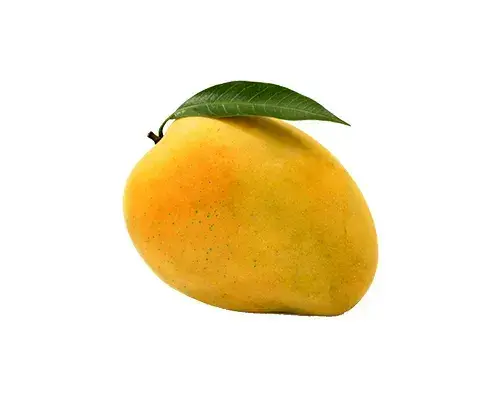
Payri
The Payri mango is a prominent mango variety grown in the Ratnagiri Devgad area on India's western coast. Payri is commonly used with Alphonso mango to make Aamras (Mango Juice).
It's not as sweet as Alphonso, but its juicy Aamras made with Alphonso and Payri mangoes is delicious.
- Season: April to June
- Shape: Oval-shaped
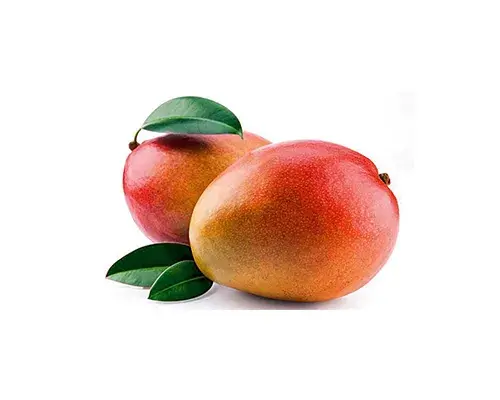
Kesar
The Kesar mango, also known as Gir Kesar, is grown in Gujarat's Girnar foothills. It's well-known for its vivid yellow pulp.
In the year 1931, Junagadh Wazir Sale Bhai in Vanthali was the first to grow this mango.
- Season: June to July
- Shape: Roundish shape with a curved tip
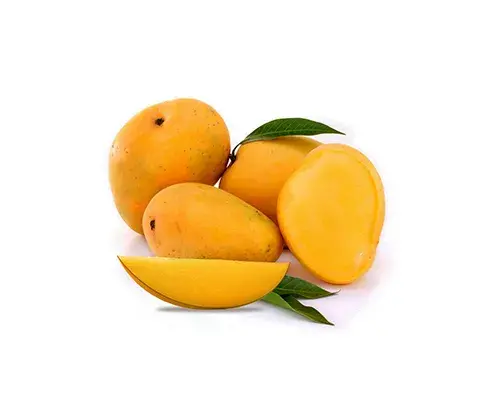
Neelum
Neelum is a South Indian dessert mango that is commonly grown in India and, to a lesser extent, in southernmost China.
Neelam mangoes are prized for their exquisite shape, flavor, and flowery perfume. The neelam is a popular choice because of its ease of availability.
- Season: May to July
- Shape: Ovate Oblique
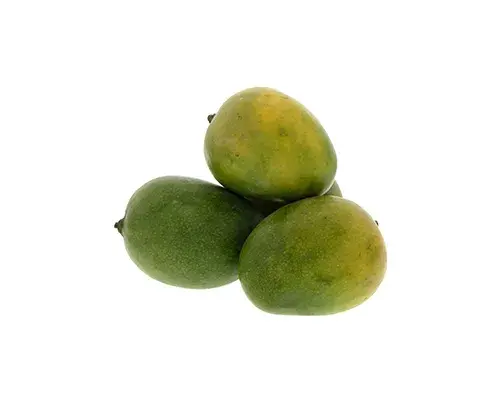
Alphonso/Hapus
The Alphonso is a seasonal fruit that is available from mid-April to late June. The fruits have a rich, creamy, sensitive texture and a delicate, non-fibrous, juicy pulp that weighs between 150 and 300 grams (5.3 and 10.6 oz).
- Season: May to June
- Shape: Voluptuous Oval-shaped (ovate oblique)
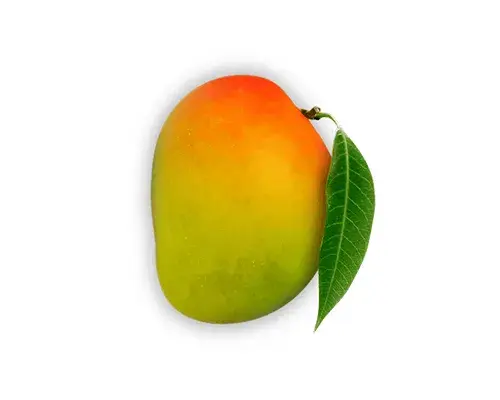
Dasheri
Dasheri mangoes have a sweet flavor and are classNameified as"table" mangoes, which means they're best eaten fresh and out of hand.
The fruits can be eaten simply sliced and served as a healthy dessert or snack, or the flesh can be mixed into drinks, shakes, and smoothies.
- Season: June to July
- Shape: Elongated
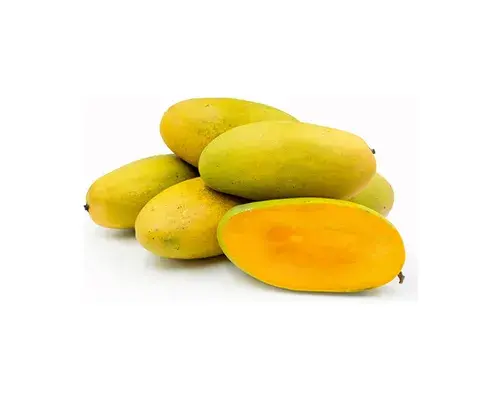
Totapuri
These mangoes are high in vitamin C, which helps to enhance one's immune. They are a strong source of zinc, which is crucial for supporting the immune system's overall health, in addition to vitamin C.
- Season: June to July
- Shape: Oblong with a beak-like pointed end
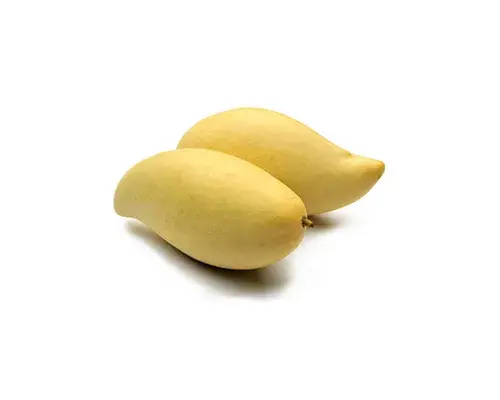
Chausa
The Chaunsa mango is both succulent and sweet. In Pakistan, this mango is as well-known as it is in India.
Chaunsa Mango Shape and Color:- A ripe chaunsa mango has a golden-yellow colour and is pleasant to the touch.
- Season: July to August
- Shape: ovate (egg-like) to oval oblique
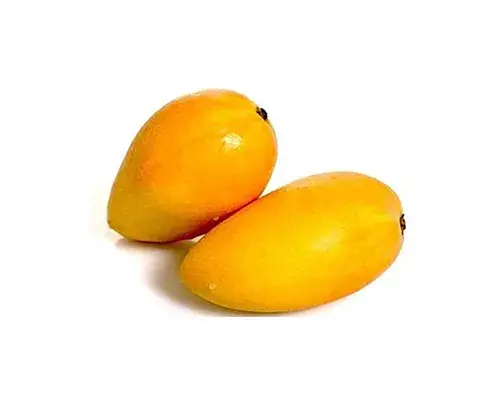
Himsagar
The Himsagar mango is a thin-skinned mango with no fibrous skin, a golden tint, a nice scent, and unsurpassed sweetness. It grows in West Bengal's Malda, Murshidabad, Nadia, and Hooghly districts.
- Season: May or June
- Shape: Ovate (egg-like) shape
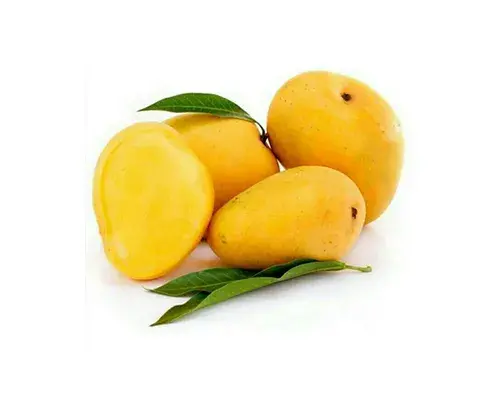
Langra
Langra is a well-known mango variety that hails from Varanasi, Uttar Pradesh. If we go by the name, it's called langra since it was first cultivated in the farmlands of a guy who couldn't walk.
- Season: Mid July to August
- Shape: Ovate (egg-like)
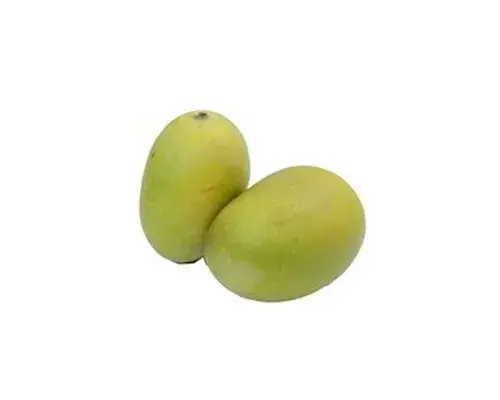
Aiding Weight Loss
Mangoes are a fiber-rich healthy food that promotes digestion and helps you feel fuller for longer, making it easier to control calorie intake.
Enhancing Love and Passion
Known as the "love fruit," mangoes are considered an aphrodisiac and may enhance virility in men.
Improving Eye Health
Mangoes are packed with vitamin A, which is essential for maintaining healthy eyes and preventing night blindness and dry eyes.
Supporting Digestion
The enzymes in mangoes aid in breaking down protein, improving digestion and preventing stomach-related ailments.
Prevents heat stroke
Mangoes are a cooling fruit, making them perfect for summer. Consuming mangoes can help prevent heat stroke and keep you refreshed.
Strengthening the Immune System
The combination of vitamins C, A, and carotenoids found in mangoes enhances the immune system, making it stronger and more resilient.
Serving as a Natural Body Scrub
Mangoes can also be used as a body scrub. Mix mashed mango with honey and milk, apply it to your skin, and enjoy a smoother, softer texture.
Improving Memory and Concentration
Mangoes are a great healthy food for boosting concentration and memory, making them ideal for students and professionals alike.
Preventing Anemia
With their high iron content, mangoes are a natural remedy for anemia, especially for women who need to boost their iron and calcium intake.
Balancing Blood Sugar
While mangoes contain natural sugars, their low glycemic index ensures that they won't cause spikes in blood sugar, offering great health benefits for diabetics when eaten in moderation.
When and How Much to Eat
Mangoes, with their delectable taste, are undoubtedly one of the best things about summer. This healthy food can be enjoyed in various ways, whether sliced, added to salads, or included in desserts. However, it's essential to watch your portions, especially if you have diabetes. A cup of diced mango contains about 100 calories, and since 90% of those calories come from sugar, it can raise blood sugar levels if consumed in excess.
That said, mangoes are loaded with antioxidants and fiber, helping manage blood sugar levels and contributing to the numerous health benefits. To enjoy the Benefits of Eating Mango without any adverse effects, start with a small portion and monitor how it impacts your blood sugar levels.
In conclusion, mangoes are a versatile, nutrient-rich healthy food that offers a wealth of health benefits. From improving skin health to supporting digestion and even fighting cancer, the Benefits of Eating Mango are undeniable. So, the next time you crave something sweet, reach for a mango and enjoy this wonderful fruit guilt-free.
Guides
- Benefits of Protein
- 7 Healthy Eating Habits
- 7 Most Effective Exercises At Home
- Home Workout Plan Without Equipment
- Top 10 Biggest Nutrition Myths
- How To Get Flexible Body?
- Weight Loss VS Fat Loss
- What is Keto Diet?
- What Is Minerals?
- What Is Digital Marketing ?
- Best Free Tools For Beginner You Tubers
- Best Teas For Weight Loss & Fat Burning
- Green Tea: Health Benefits And Side Effects
- Yoga for Weight Loss and Fat Burning
- What Is Type-2 Diabetes?
- How To Write Eye-Grabbing Resume
- The Ultimate Guide To Prepare For An Interview
- 10 Best Health Benefits Of Eating Mango
- healthy eating habits for kids
- 10 tips for starting your Fitness Transformation
- 10 Reasons Why People Hate Gym & How to Overcome Them
- Fuel Your Passion For Nutrition: Explore The Power Of A Nutrition Course
- Shed Pounds with Ease: Vegetarian Diet Plan for Weight Loss Revealed!
- Anabolic steroids: Types, Uses, and Side Effects
- Find Your Path to Success: Choosing the Right Fitness Certification Program in India
- learn gym trainer course offline at surat with best faculties
- Learn about Body Composition and How it Affects Your Health
- Nutrition course online with affordable fees
- Online Dietitian Plan vs In-Person Consultation: Which is Right for You?
- The Importance Of Fitness Education In Today's World
- How to find right fitness institute in india
- How to Actually Build Muscle When You Work Out
- Is Becoming a Gym Trainer in India Worth It?
- Why Online Dietician Courses Are in High Demand in India: A Practical Guide for Future Professionals
- 7 Powerlifting Training Mistakes Beginners Still Make & (How to Fix)
- Top 10 Evidence-Based Immunity-Boosting Habits to Stay Healthy in 2025
- What Can You Do After Personal Trainer Certification? Real Career Outcomes 2026
- Choosing a Fitness Coach Course That Actually Pays: The 2026 Guide
- Is your NSDC Fitness Certificate Valid in Dubai? The 2026 Guide for Indian Trainers
- 7 Fitness Trends 2026: What Experts Actually Predict
- 10 Types of Group Fitness Classes Near Me


About Dr.Gautam Jani
Dr. Gautam is a civil engineer. By passion he is a dietitian and had started practising it in the year 2016. He is the founder of fitnesswithgomzi firm established in 2018. He has achieved many certificate from ACSM, ISSA and VLCC.

